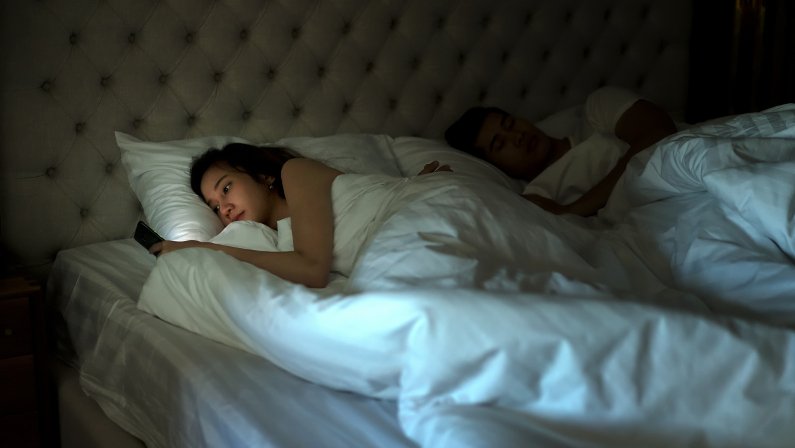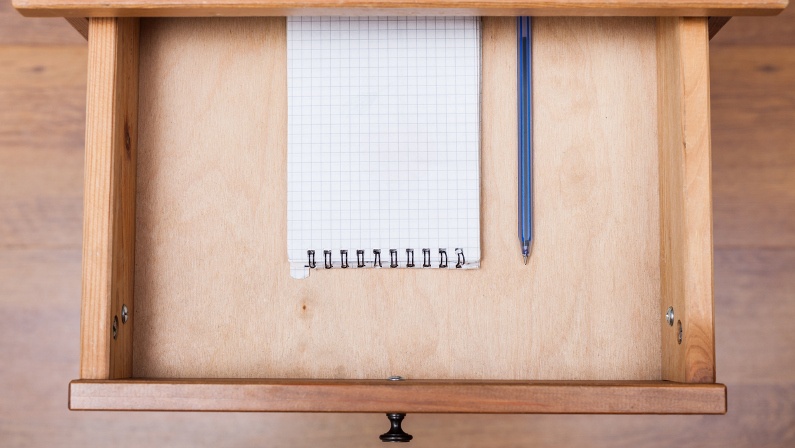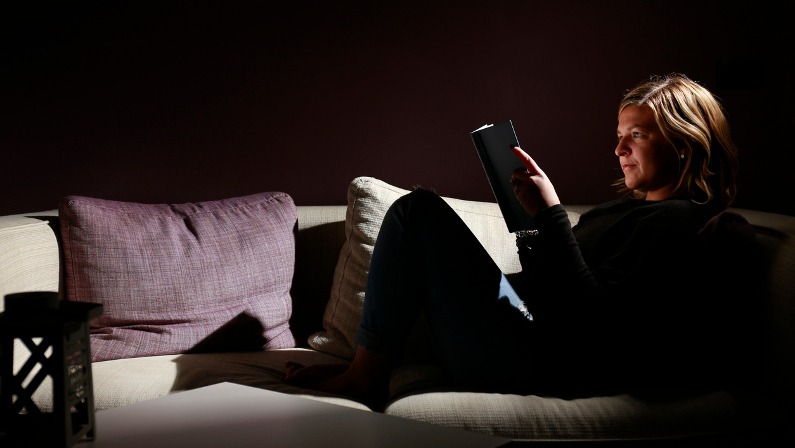It is estimated that one in five adults suffer from insomnia. If you often have a hard time going to sleep, wake up in the middle of the night and can’t get back to sleep again or, even when you sleep a good number of hours, you feel you don’t wake up refreshed, you may be suffering from insomnia. The problem is that keeping a situation like this for a long time will inevitably affect your quality of life.
If this is your case, my suggestion is simple: start investigating your health immediately. It is necessary to know if there is any medical issue or sleep disorder that is jeopardizing your nights.
In my career as an executive, I´ve been through periods of stress at work. In those moments, my old friend insomnia always came to keep me company.
In fact, I´ve learned to identify insomnia as one of the first symptoms indicating that my stress level is high. Sometimes it’s not so obvious to identify! But for me, it ends up serving as a warning sign. If I start to lose sleep, I try to figure out the causes of the stress, what I can do to relieve it, and what I have to change in my way of thinking or in my daily habits.
It is horrible to suffer from insomnia and I decided to write this article just to share some of what I´ve already learned (and suffered!) over the years.
My recommendation, especially if you are dealing with insomnia for the first time in adulthood, is to go to your doctor, your therapist or a sleep specialist to fight this syndrome. These professionals will help you identify the cause of the problem, suggest a treatment and accompany you until you sleep well again.
In some cases, however, there are some simple measures (which I’ve listed at the end of this article) that may already help. But, one thing is certain: insomnia can be treated, and you don´t deserve to live with low quality sleep. Get to work and you´ll overcome it!
There are different types of insomnia and for each of them there is a specific treatment. Thus, identifying in which category your insomnia falls into is the first step in restoring the quality of your sleep. The three main types are:
1. Transitory: lasts up to three nights, caused by a very precise happening, like the eve of an important event;
2. Acute: May last a few weeks. In this case, the reasons may be, for example, a traumatic event or a peak of a family or professional stress;
3. Chronic: stays for a few months or years. According to the US National Institutes of Health, in general, it is the side effect of some other problem that affects your health, such as a medical condition, sleep disorder or medications. In some cases, chronic insomnia may be the primary problem, and although its causes are still poorly understood, factors such as emotional disturbances, chronic stress, constant trips to different time zones, or work between alternating shifts can help to explain the problem;

Woman with insomnia at dawn (Photo: patchareeporn_s / iStock
Just as it is important to identify the type of insomnia, to be effective, the treatment needs to identify its cause. In general, by identifying the cause and treating it, insomnia also ends.
The main causes of insomnia are:
1. Psychological problems: anxiety, depression, stress, bipolar disorder, psychotic disorders;
2. Medical conditions: sinusitis and allergies in the nasal passages; breathing problems such as apnea or asthma; gastrointestinal problems such as reflux or constipation; hormonal disorders such as PMS, menopause or hyperthyroidism; neurological disorders such as Alzheimer’s or Parkinson’s disease; pains in the body such as constant back pain and arthritis; or restless leg syndrome, when you have difficulty keeping your legs still and you do not get to sleep deeply;
3. Medications: Some types of medications can cause insomnia if they contain stimulants such as caffeine;
4. Biological predisposition: There are certain neurotransmitters and countless chemical interactions in the brain that can affect the balance between sleep and wakefulness. Some people, due to a biological predisposition, have a tendency to suffer from insomnia, even without an apparent cause and even following adequate guidelines to have a good sleep;

Woman working in her bed just before getting to sleep (Photo: RapidEye / iStock)
5. Food: Caffeine and nicotine are stimulants and, if ingested at night, can cause problems. The same is true for alcohol consumption which, although acts as a sedative, can disturb the sleep in the middle of the night. Finally, heavy meals at night can also cause difficulty sleeping;
6. Lifestyle: taking naps in the afternoon or early evening, working at home at night, working alternating shifts at work (day and night, night and day), sleeping late to compensate for poorly spent nights, constant trips to areas with different time zones, watching TV, tablets or cell phones in bed before bedtime. All these factors can disturb the sleep routine.
7. Environment: sleeping next to a partner who snores, on a bad mattress, in a bright or a noisy place, where there are many parasites, as mosquitoes, also affects the quality of sleep.
If you have been suffering from insomnia for some time and this has already begun to affect your life, my recommendation is to look for your doctor and try to figure out the causes of the poor quality sleep:
● If the cause falls between topics 1 to 4 described above, you will need the help of your doctor, a sleep specialist or a good psychologist to solve the problem. The treatment is individual and is usually associated with solving the primary cause of insomnia.
● If the cause falls between topics 5 and 7 described above, the treatment is also individual, but here are some tips for you to put into practice. These “good practices” of sleep will be part of your doctor’s guidance. However, I´ll already share some of them that I have learned and practice regularly.
● Make sure your bedroom is quiet, dark and cool. If necessary, install blackouts, wear eye cap masks, ear protectors (which you buy at drugstores or building stores) or even a fan or an air conditioner to block out the sound from outside the room;

Simple notebook (Photo: VvoeVale / iStock)
● Leave a notebook next to the bedside table and if you take long to sleep or wake up in the middle of the night worried about something, write the reason for the concern in the notebook in order to be resolved the next day. Doing this helps you relax. You will not be trying to solve the problem or even worried about forgetting to solve it the next day. This is a golden tip when the problem is anxiety. I often use this trick and it helps me a lot.
● Try to regulate and restrict your sleep, that is, have a precise time to sleep and wake up every day, including weekends. The more regular, the more your body will get used to the routine. The messier, the worse the scenario gets.
● Practice stimulus control, that is, learn to associate your bed to sleep rather than insomnia:
Use the bedroom just to sleep and have sex. Any other activity, including reading, working or watching TV, should be done out of the room.
If you can´t sleep, or if you wake up in the middle of the night and can´t fall asleep again in less than 20 minutes, leave the bedroom and go to another spot of the house to do something calm and relaxing. Do not stay rolling in bed!
Do not leave the smart phone on the bedside table, nor clock radios on with the time exposed.
● Reduce the lights and signal to your brain that it is time to sleep. At least one hour before bedtime, turn off the strong lights of the house and turn on the secondary lights (such as lamps). Turn off and stop watching any and all screens, including phones, tablets or TV.
● Calm down the house. Also an hour before bedtime, put the children to sleep and engage in relaxing activities such as reading a book, taking a warm bath or even listening to calm music.
● Avoid activities that stimulate you or stressful situations before bed. Solving work problems, having hard discussions with your spouse or even receiving very bad news at night will disrupt your sleep. Remember that at night things always seem worse than in the morning.
● Prefer doing physical and sports activities during the day. They are stimulating, and your body will take time to calm down.
● Avoid taking naps in the afternoon and early evening. If it is inevitable, limit it to 30 minutes and be up before 3 p.m.
● Avoid foods, beverages, or stimulants at night, such as caffeine, chocolate, or nicotine. They can make it harder for you to fall asleep.
● Avoid eating foods or beverages that may wake you up in the middle of the night. Avoid drinking alcohol (although it makes it easier to fall asleep, it may wake you up later) or too much liquid before bedtime (a full bladder can make you wake up to go the bathroom). Also, do not eat heavy meals near bedtime (a greater difficulty in digestion may wake you up eventually).
● Avoid excruciating yourself for waking up. Often, the anguish you suffer from waking up is what will keep you from sleeping!
● Make it your goal to relax and not necessarily sleep. You may not be able to sleep, it’s true! But night time is a time to relax and unwind. It’s as if it’s a consolation prize, but it’s still much better and healthier than rolling back and forth in bed anguished for not being able to sleep.

Woman reading on sofa (Photo: claudio.arnese / iStock)
● Do a relaxing and calm activity outside the room. If you can’t go back to sleep, go to another room and read a quiet book in low light, listen to low, relaxing music or meditate. If sleep comes, go back to bed and sleep (sometimes, though, I fall asleep on the sofa…).
● Don´t try to solve the problems that distress you in the middle of the night. Write down what worries you in a notebook and program yourself mentally to solve it during the day. It doesn´t always work, depending on the severity of the issue, but I did it many times and went back to sleep right after…
● Practice relaxation techniques to help you get back to sleep. Take a deep breath, using the abdomen, rhythmically, a couple of times, until you are very calm. Visualize the muscles of the body relaxing one by one. Practice mindfulness meditation by focusing your attention on your body, on here and now.
As I mentioned earlier in the article, I am also part of the 20% of the population suffering from insomnia – and it is the kind that makes me wake up before the alarm clock. I start waking up 30 minutes early and, in the most acute moments, I wake up three hours ahead of schedule, every single day. After a week, I’m a mess and I remember the days when I had a newborn baby at home…
In my case, insomnia appears in periods of high anxiety and only goes away when I solve the situation. However, practicing the techniques above helps me a great deal, either by facilitating treatment, or by reducing the occurrences or duration of insomnia episodes.
When I wake up and realize that I will not be able to go back to sleep, I get up, do two or three isonomy exercises, which help me tone the muscles lightly and serve as a “reboot” for my body. Next, I take some abdominal breaths and meditate a little. All this takes about 15 minutes. Then I lie down and relax until the alarm clock rings.
On a good night, sometimes I can go back to sleep, but even if that does not happen, the relaxing effect is great and I feel it when the alarm goes off at last, I am whole and feeling better than if I had been rolling from one side to the other distressed.
I hope today’s article has shown you some way to help you overcome your insomnia. With all my heart, I wish you luck! And remember: you are not alone in this. There are a lot of good people who can help you. You deserve to sleep well and there is treatment for insomnia.
Cover photo credit – Man awake with insomnia (Photo: fergusowen / iStock)